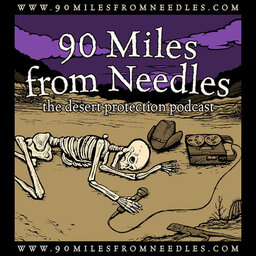S3E28: There Ain't No Big Faucet: Water Politics with the Great Basin Water Network
About the Guest:
Kyle Roerink is the Executive Director of the Great Basin Water Network. Roerink has been a pivotal figure in advocating for sustainable water management across the Great Basin and the Colorado Plateau. His organization has played a significant role in addressing critical issues related to water rights, environmental protection, and the ecological impact of industry and urban development in the arid Southwest.
Episode Summary:
In this engaging episode of "90 Miles from Needles," Chris Clarke speaks with Kyle Roerink, Executive Director of the Great Basin Water Network, about the ongoing battles and emerging concerns regarding water rights and environmental conservation in the arid regions of the Great Basin and the Colorado River Basin. The conversation kicks off with a light-hearted discussion about an unusual statement from the former president regarding a mythical "faucet" to solve water issues in California, setting an intriguing tone about broader misconceptions and real challenges. The episode delves deep into current projects and proposals that threaten the water security and ecological balance in the regions. Roerink highlights the pressing issues surrounding lithium mining in Green River, Utah, and its potential environmental impact. The conversation explores the novel direct lithium extraction technology and the legal precedents it may set, impacting future mining projects in the area. The discussion also touches on the alarming number of proposed new dams and diversions in the Upper Colorado River Basin and the implications for downstream water rights and ecological health.
Key Takeaways:
Direct Lithium Extraction and Environmental Concerns: The controversial lithium mining project in Green River, Utah, utilizing direct lithium extraction technology, poses several environmental risks and legal challenges, particularly concerning groundwater rights and public welfare.
Over-Allocation of Colorado River Water: The ongoing issues of water over-allocation on paper versus actual availability, exacerbated by climate change and decreasing water flows, put immense pressure on water management across the Colorado River Basin.
Ecological and Legal Implications of New Dams and Diversions: The numerous proposed dam and diversion projects in the Upper Colorado River Basin underscore the need for rigorous scrutiny and sustainable planning to prevent exacerbating water shortages and ecological damage.
Glen Canyon Dam and Long-term Water Management: Discussion on the feasibility and future of maintaining both Lake Mead and Lake Powell reservoirs, with a growing consensus favoring prioritizing Lake Mead due to infrastructural and water delivery benefits.
Community and Environmental Advocacy: Highlighting the importance of grassroots advocacy, collaboration among diverse stakeholders, and the significant role of public knowledge and engagement in addressing the complex water issues in the arid Southwest.
Notable Quotes:
Kyle Roerink: "We can only do the green energy transition once. There's no room for error, there's no margin for error."
Chris Clarke: "There's a whole lot of money that you can make in destroying the desert, but not too much in saving it."
Kyle Roerink: "Mother Nature is the best teacher."
Kyle Roerink: "I think, like post federal lands Policy and Management act, that post Flitma era and push that really bolstered the environmental movement."
Kyle Roerink: "If we're to believe the nation's best scientists, the worst is yet to come."
Resources:
Great Basin Water Network https://greatbasinwater.org/
Living Rivers http://www.livingrivers.org/
Glen Canyon Institute https://www.glencanyon.org/
UC Berkeley Climate Futures Lab https://nature.berkeley.edu/ClimateFuturesLab
For more groundbreaking discussions about desert protection and water conservation, don't forget to listen to the full episode and stay tuned for more insightful content from "90 Miles from Needles." The desert needs your support and awareness now more than ever.
 90 Miles from Needles: the Desert Protection Podcast
90 Miles from Needles: the Desert Protection Podcast


